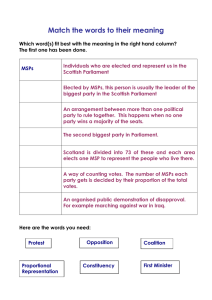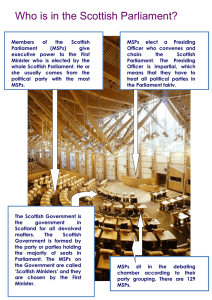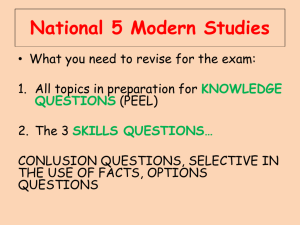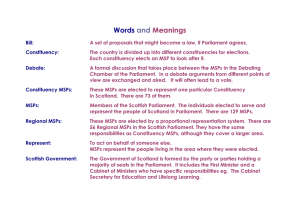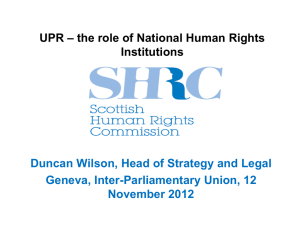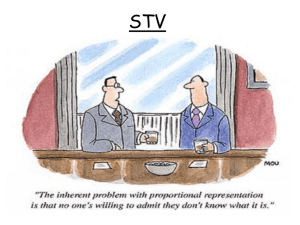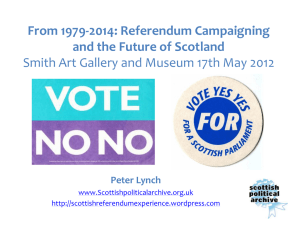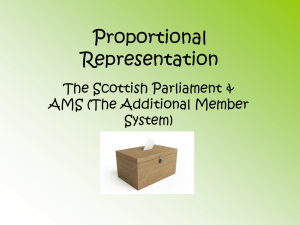National 4/5 Modern Studies
advertisement
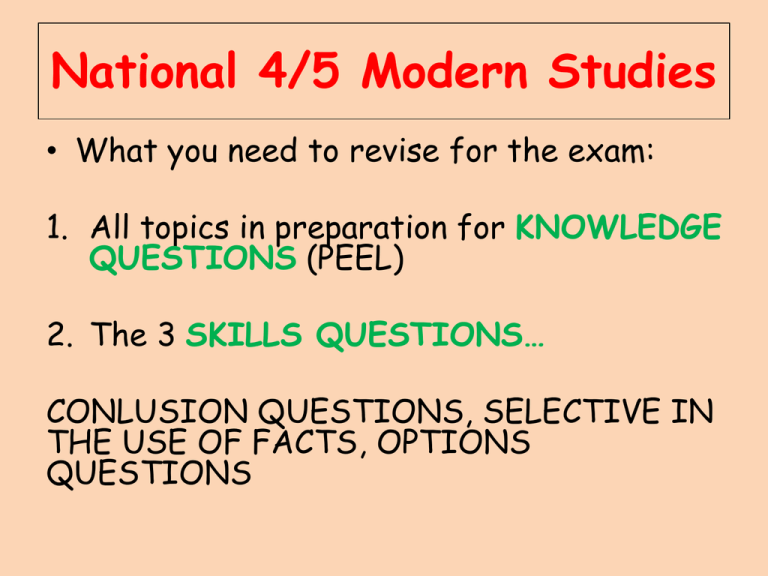
National 4/5 Modern Studies • What you need to revise for the exam: 1. All topics in preparation for KNOWLEDGE QUESTIONS (PEEL) 2. The 3 SKILLS QUESTIONS… CONLUSION QUESTIONS, SELECTIVE IN THE USE OF FACTS, OPTIONS QUESTIONS KNOWLEDGE QUESTIONS • Three topics: 1. Democracy in Scotland 2. Social issues in the UK 3. International issues (the USA) DEMOCRACY IN SCOTLAND • Background knowledge… • Structure of Government in Britain – UK Parliament (House of Lords and House of Commons), Scottish Parliament, the monarchy, Prime Minister, First Minister, UK and Scottish Cabinets, Local Government, relationship between UK and Scottish Government, what councillors can make decisions on DEMOCRACY IN SCOTLAND Representation 1. Role of MSPs and Councillors, how constituents can contact representatives 2. Role, function and areas of the Scottish Parliament 3. How MSPs represent constituents in constituency and in Scottish Parliament 4. First Minister’s Question Time, Debates, voting, committees, Members’ Bills 5. Work of a local councillor, how councillors can represent their wards, how councillors can resolve local conflicts (e.g. budgets, road by-passes) DEMOCRACY IN SCOTLAND Participation 1. Political Parties – know main parties and basic policies 2. Purpose of political parties 3. Standing as a candidate – qualities needed 4. Election campaigns – purpose, process and outcomes 5. Why it is important to use right to vote 6. Voting systems – advantages and disadvantages of the Single Transferable Vote (STV) and the Additional Member System (AMS) DEMOCRACY IN SCOTLAND Influence – Pressure Groups 1. Purpose 2. Aims 3. Methods used 4. Examples of pressure group action SOCIAL ISSUES IN THE UK Social Inequality 1. Poverty – what is poverty, relative and absolute poverty, social exclusion, groups most at risk from social exclusion 2. Causes of poverty – unemployment, low pay, benefits system, family structure, gender, race 3. Consequences of poverty - lack of necessities, ill health – mental and physical, inequality in education, social exclusion, poor housing, addiction problems, homelessness SOCIAL ISSUES IN THE UK Groups that tackle poverty 1. Central Government – benefits system, support for children and families, attracting jobs to UK, training and education, welfare to work, minimum wage, heating allowances, Big Society 2. Scottish Parliament – social inclusion, education, inclusion and equality policy 3. Local Authorities – Housing and Council Tax Benefit 4. Voluntary Sector – groups that tackle child poverty 5. Private Sector – job creation, greater role for private sector SOCIAL ISSUES IN THE UK Health Inequalities 1. Lifestyle, social and economic disadvantages, geography, environment, age, gender, race 2. Groups that tackle health inequalities – The Scottish Parliament, NHS Scotland , Health Promotion and Education, the voluntary sector, local authorities- free school meals, private sector – private health insurance, PPP 3. Social inequality – focus on one of the following: race, gender, social class, gender, age, disability INTERNATIONAL ISSUES – THE USA The USA 1. Background – powerful country, relevance to Scotland 2. Political issues – type of government, parts of government, participation 3. How democratic is the USA? 4. Social and Economic issues – population/immigration, employment, wealth and health inequalities, education, housing, crime and law (Focus on 2 or 3 of these) 5. Government response to social and economic issues 6. Rights and Responsibilities of citizens SKILLS QUESTIONS 1. SELECTIVE IN THE USE OF FACTS 2. OPTIONS QUESTION 3. CONCLUSION QUESTION KNOWLEDGE QUESTIONS International Issues – USA KU Advice Questions will not be specific to the USA…instead they will be worded as below: 1. 2. 3. 4. 5. 6. Describe, in detail, two ways citizens from a world power you have studied can participate in politics Explain, in detail, why social and economic inequalities exists in a world power you have studied. Describe, in detail, at least two main political institutions of the government of a world power you have studied. Choose one of the following – poor education, health inequalities, fear of crime, or poor housing. Explain, in detail, why this issue continues to be a problem in a world power you have studied. Describe, in detail, the rights and responsibilities of citizens from a world power you have studied. Explain, in detail, why some groups from a world power you have studied experience social and economic inequality. International Issues – USA Skills Advice • The skills question in this section may not be specific to the USA • Remember though, you simply use the correct technique and no background knowledge is required Revision Topics • Scottish Parliament – voting systems, local councils, SP basics, pressure groups, qualities needed for standing as a candidate • Social Inequality – Groups that tackle inequalities • USA – how democratic Voting Systems • Just remember the pros and cons of the following: • FPTP • AMS • STV FPTP Advantages Very easy to understand – whoever gets the most votes wins FPTP Disadvantages Smaller parties such as Green Party have little chance of being elected Usually leads to strong majority Leads to a two party system where governments – e.g. Labour 1997-2010 Labour and Conservatives dominate One representative per constituency – Majority governments can be bad as no confusion. E.g. Glasgow East MP is other party’s views are ignored Margaret Curran – people know who to undemocratic go to AMS Advantages AMS Disadvantages It is fairer - there is a more proportional link between votes and elected representatives It tends to produce coalition governments, which would have to involve compromise. This means it is difficult to pass bills. There still is a link between the MSP and the constituents as voters vote directly for their constituency MSP (paper 1) There are two types of MSPs constituency MSPs and list MSPs – can be conflict between them Smaller parties can get representation It is a confusing system – people fill (e.g. Green Party, Scottish Socialist in ballot papers wrongly Party) Some people feel their vote is less likely to be wasted as they get two votes. If their constituency choice is not elected then they will be represented through their regional MSPs. In total 8 MSPs to represent you. Small parties, or even individuals, can arguably have too much power because their votes are needed by more popular parties STV Advantages STV Disadvantages This is fairer for voters as they have more choice in approaching representatives if they have an issue. This is because there is more than one councillor in each ward A candidate who has a achieved a low percentage of the vote may be elected and this is unfair as the representative will have the same status and power as an elected representative with a higher vote STV is very proportional: the percentage of votes a party gets is roughly the same as the percentage of councillors they get The process of counting the results takes longer under STV, meaning that results cannot usually be declared on the same night as the vote took place. Smaller parties and independent candidates It is a confusing system – people don’t have a realistic chance of being elected, e.g. understand it and fill in ballot papers the Green Party or BNP wrongly In STV voters have more than one vote. This is fair as voters may like more than one candidate and they can express their views more accurately Local Councils – Funding • How are councils funded? 1. Revenue Grant from Scottish Parliament – a lump sum of money (80% of council money) 2. Council tax – people who live in council areas pay council tax to council. Varies depending on size and value of property 3. Non-domestic rates – businesses pay a council tax so that they can trade in the council area 4. Charges for services – e.g. swimming pool or gym charges, late fees at library Miss Firth Mr Canning Mr Scollin 1 USA Knowledge Scottish Parliament Knowledge Social Issues Knowledge 2 USA Knowledge Scottish Parliament Knowledge Social Issues Knowledge 3 USA Knowledge Scottish Parliament Knowledge Social Issues Knowledge 4 Options Questions SITUOF Questions Conclusion Questions 5 Options Questions SITUOF Questions Conclusion Questions BBC Revision Website • http://www.bbc.co.uk/education/subjec ts/zxsnb9q Local Councils – Resolving conflicts • How can councils resolve conflicts? 1. If there is traffic congestion in an area then councils can resolve this. For example, Glasgow City Council has introduced bus lanes in city centre – fine car drivers for using these – cuts congestion 2. If a resident of a council house has issues with a noisy neighbour they can contact the council and raise a complaint. Council can then resolve the issue possibly in collaboration with police 3. If local residents in an area have concerns about pollution caused by heavy traffic the council could create a bypass road meaning that traffic is diverted from the area 4. If there is a concern about cars speeding in an area then the council is able to use measures such as introducing speed bumps, traffic lights or zebra crossings to tackle the issue and resolve the conflict. Scottish Parliament Basics • Difference between Scottish Parliament and Scottish Government • Who meets in SP? • How many MSPs are there? Types of MSP? • Who do MSPs represent? • How can MSPs represent us in constituency and parliament? • What does the Scottish Government consist of? • How are laws made? Pressure groups • • • • What are they? Methods? Examples? Why are some methods better than others? Standing as a candidate • Qualities needed? • Confident – public speaking, addressing constituents and rest of MSPs in parliament • Hardworking – demanding job, long hours, working between constituency and Scottish Parliament • Approachable – constituents have to be comfortable with asking representative for help with issues • Reliable – have to get the job done, represent constituents effectively…otherwise will not be reelected • Use common sense for this kind of question
